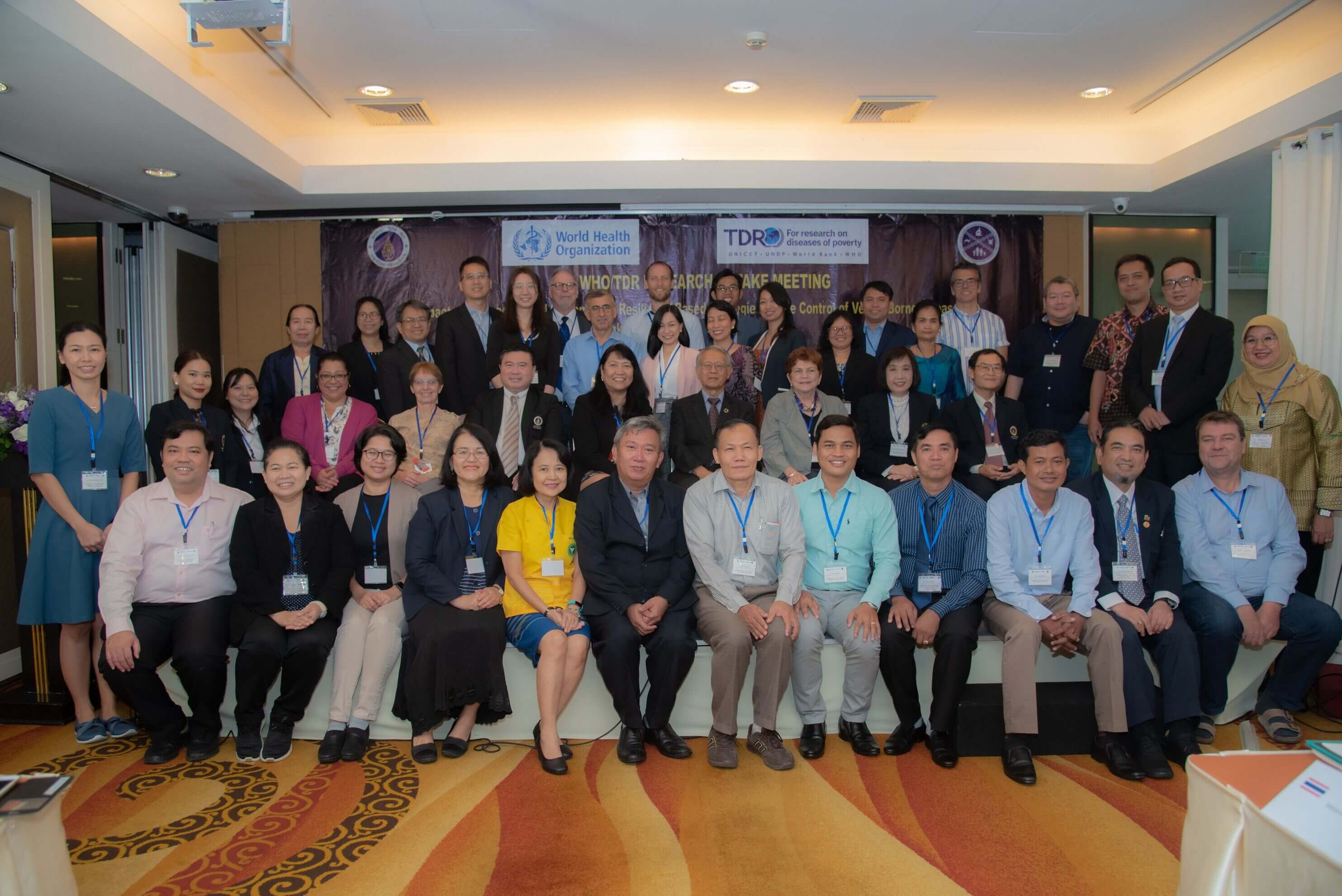News

3 Dec 2019
Research Uptake Meeting
Bringing together researchers and relevant stakeholders to facilitate evidence use, 5–6 November, Thailand
TDR supports research for implementation, working with local scientists and researchers on practical problems that make a difference on diseases of poverty. One aspect of this work is bringing researchers together with decision makers. From 5–6 November 2019, a workshop in Bangkok, Thailand, bought together researchers working on two TDR-funded mosquito control projects, policy-makers, and other partners.
The two research projects, one situated in Thailand and the second in Cambodia, are using two very different methods to reduce the local mosquito population and to fight dengue, chikungunya and Zika. The project in Thailand involves sophisticated laboratory techniques to sterilize mosquitoes and prevent them from transmitting dengue. The Cambodian project involves community-based strategies, such as breeding guppy fish to eat mosquito larvae, using mosquito traps, and integrating dengue education into the primary school curriculum. Both of these projects are dependent on strong partnerships and high levels of buy-in from communities, local and national government agencies and other stakeholders.
In addition to these two projects, TDR also supports the Social Innovation in Health Initiative (SIHI) through a global network of individuals, organizations and institutions that conduct research and advocate for social innovation in health. Members of SIHI were also invited to the Research Uptake meeting.
The meeting was jointly organized by TDR and Mahidol University in Thailand, through its focal point, Dr Pattamaporn Kittayapong.
Participants at the Research Uptake Meeting in Thailand
Approximately 50 participants attended the meeting, including:
- country delegations representing Ministries of Health, Environment, and Education;
- researchers from the TDR project portfolio in Cambodia and Thailand;
- members of the TDR scientific oversight committee and TDR technical staff;
- representatives from partner institutions: WHO Regional Office, ASEAN Institute for Health Development, ASEAN Network for Health Development, ASEAN Network for Development Innovation;
- representatives from the Social Innovation in Health Initiative (SIHI): Philippines and China hubs;
- representatives from UNDP and EN Environment; and
- Lushomo: communications partner.
Find out more about the two projects:
What take home messages would you like to share with policy-makers?
This meeting yielded a number of useful outcomes. It provided a space, not only for the researchers to present their findings, but also for researchers and stakeholders to establish a shared understanding of practical concerns, needs, constraints and priorities. Researchers were given the opportunity to share key lessons that they had learnt through their experiences and that they felt important to convey to policy-makers.
"Our 6-monthly surveys have shown clear, indisputable reduction in mosquito numbers, achieved through very simple ways of bringing down mosquito numbers. So it can be done, but it depends on successful, meaningful, sustainable engagement with communities.” – Leo Braack, Co-PI of SESR-based strategies in in Cambodia
Why is a transdisciplinary approach so important?
These projects are especially transdisciplinary – they involve a range of partners, from community members to policy-makers, across multiple fields–including entomology, ecology, epidemiology, and education. This is a necessity in order to prevent diseases that are multisectoral in nature.
“… understanding the importance of intersectoral work is going to be critical for the uptake of these processes. How do we put them into policy? How do we operationalise this into programme planning? This is going to be a critical impact from these projects.” –Dr Mojgan Sami, Oversight Committee for TDR’s Health and Environment Programme
What did you think of the Research Uptake meeting?
For many, although this type of meeting was a first, it was considered a vital step in establishing connections, creating a common understanding of vector-control goals, and moving research forward in its real-world application. The workshop ended with agreements on the way forward and next steps to take, and the different parties came away enthused by their shared learning and looking forward to future collaboration and engagement.
I think it’s a very good workshop. I have never attended this kind of workshop before, but it is a very important step to move forwards from the research […] to use in the real world.” –Dr Darin Areechockchai, Epidemiologist and Deputy Director of the Division of Vector-Borne Diseases, Ministry of Public Health, Thailand

